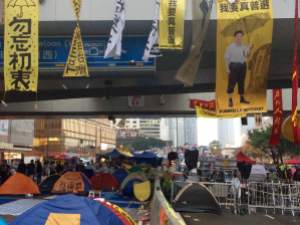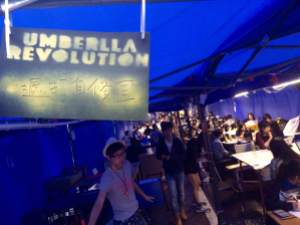
Out of respect for her privacy, I do not ask her name. She is young, bright, beautiful, and spoke much better English than I did either Mandarin or Cantonese. I found her working diligently in front of her laptop in the “Study Hall” tent, as I wandered through the sprawling cardboard-and-nylon city that marked one of three #OccupyCentral encampments in Kowloon and Hong Kong’s downtown financial centers. A student of psychology at nearby University of Hong Kong, she comes to Occupy “whenever I have free time,” she says. “I was not with the students at the beginning of the protest, but I am here now.”
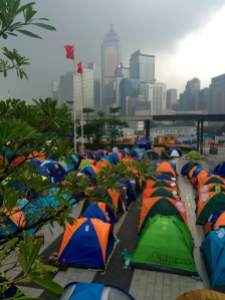
Despite the bustle of a late afternoon Friday in Asia’s “world city,” the downtown #UmbrellaMovement tent city, now in its 41st day, seemed deserted, save for 2 small press conferences, several clusters of students engaged in study or quiet conversation, and gawking global tourists snapping photos (me included). “What do the students hope will happen here?” I ask her. “We are here because we learn about democracy in school,” she replies, “but our voices are not heard in Hong Kong.” This encampment, erected outside the Hong Kong legislature’s official meeting building, itself dwarfed by the colossal towers that mark HK’s financial center, is as symbolic a place as any for Hong Kong students make their voices heard.
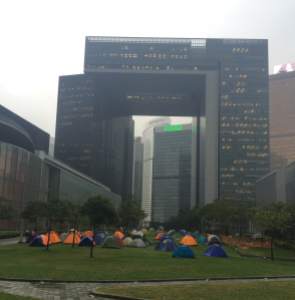
She and I agree that a peaceful outcome would be best. She explains that the government broke off dialogue after not really listening to student concerns, and now is silent, except for the continuous police presence around the tent city’s borders. She is hopeful but realistic about the immediate challenges ahead. I am a “Jiashou” back in “Mei Guo” (a college professor in America) I explain, and I tell her of my support for the #OccupyWallStreet movement a few years back. “It is important for young people, for all of us, to raise our voices,” I said. “Good luck – I support you.” She smiles, we do a fist bump, and she turns back to her study of the screen as I wander off into the mist and rain of late afternoon in Hong Kong.
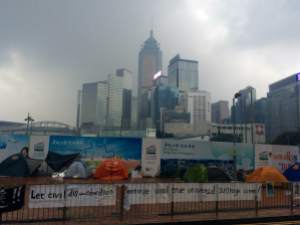
The Hong Kong’ers I talk to are decided divided about the students “public activity” (in official HK tour/govspeak). “It’s bad for our business,” grumbles one taxi driver, capturing general sentiment, although when I push him, he acknowledges that his heart is with the students. Later, when I ask a twenty something barrista in a nearby Starbucks about what he thinks of #Occupy, he at first gives me a blank look. “The students right over there,” I say. “Oh, you mean the Revolution?” he says, smiling. “I think the students’ demands for change are too big, and Hong Kong now belongs to China, and China will not let it happen. But I support them. They are right.”
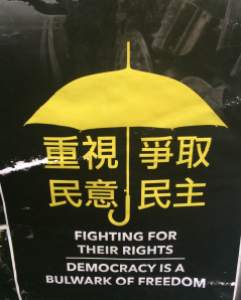
His “take” mirrors that of the U.S. mainstream “news” media, framing the story as an oppressive Red China (remember Tiananmen in 1989?) versus brave young Hong Kong’ers exercising their rights. The bigger story? HK’s social media observers point to global neoliberalism’s deep inequalities – the average HK’er can’t find a job, afford an apartment, and live here any more, notes one young blogger. Whether its China’s kleptocratic Communist party, or the rapaciousness of Western capital, the larger truth is that Globalization’s day of judgement is nigh – in the form of accelerating environmental degradation, deepening social and economic inequalities, and an uncertain future marked by climate change and Peak Oil realities.
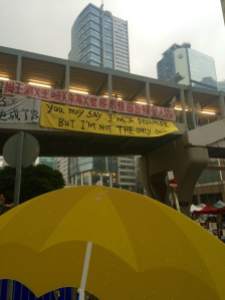
After forty hours in Hong Kong, I am impressed by this city’s bustling beauty, rich history, friendly locals, and cosmopolitan vibe. And I wonder what this place will look like in 2050. Is it possible, I wonder, to design a more equitable and resilient future, one in which our young people who work hard and play by the rules have a fighting chance of success? And my conversation in the tent reminds me that sometimes, we gotta challenge the rules.
Good luck to #OccupyCentral, and thanks for your courage.







